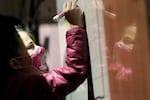Later this month, thousands of Oregon students will begin to head back to schools across the state, the third school year affected by COVID-19.

Emilie Thompson tries to work out the answer to a math problem in Eric Marsh’s third-grade class at Prescott Elementary in Portland, Feb. 8, 2022. Educators at the Northeast Portland school are working to get students engaged and create a school community—two pieces of education that have been impacted by the long duration of the pandemic.
Kristyna Wentz-Graff / OPB
But how each school handles the coronavirus and its risks will be up to individual decision makers and local public health authorities, a continuation of how Oregon schools operated last year.
“This year, nearly all health and safety protocols will be locally determined, with district leaders partnering with local public health authorities to make decisions about how to implement health and safety protocols to keep schools open by keeping staff and students healthy,” said Oregon Department of Education director Colt Gill at a press conference Wednesday.
Some statewide rules are still in effect, including the vaccination requirement for teachers and other school staff.
But decisions around whether to require masks, ventilation protocols, and testing procedures remain in local hands. State officials point out that individuals may choose to wear face masks, even if they’re not required.
The question of how much the state should require vs. how much it should advise districts and allow local decision-making has been a source of tension practically since the pandemic began. Some school leaders are welcoming the state’s approach for this fall.
“We are very appreciative as local school districts to be provided with a little bit more authority in an effort to meet the needs of each of our unique communities that we all serve and represent,” said Estacada superintendent Ryan Carpenter on OPB’s Think Out Loud Wednesday.
Carpenter said the district remains focused on keeping schools open while also supporting students and families no matter what choice they make around masks.
“We just want to really honor the individual and their choice as we welcome all kids back to school this year,” Carpenter said.
In his comments Wednesday, Gill emphasized the importance of those locally-controlled, layered mitigation strategies, but said statewide intervention may be possible in the future.
“If there is a variant that comes forward with severity, in terms of the illness that it brings, and it becomes highly contagious, like omicron, then we will coordinate and work with all of our partners to determine if any statewide action is needed,” Gill said.
Gill also stated a continued focus this year on student mental health, including a new online tool that provides resources to students.
Officials from ODE and the Oregon Health Authority continue to encourage families to get their children vaccinated against COVID-19. There are no plans to require the COVID-19 vaccine for Oregon students this year, OHA officials said.
Last week, the Centers for Disease Control and Prevention updated its guidance for schools, removing recommendations to organize students into stable cohorts and to require students to quarantine out of school in the event of exposure. The CDC also removed recommendations for test-to-stay programs, which allow students who’ve been exposed to COVID-19 to stay in school if they test negative.
Gill said those changes already reflected the reality in Oregon.
“We are in alignment with the new CDC changes in relation to changes we made last spring for our school districts,” Gill said.
OHA suspended its test-to-stay program and removed its quarantine recommendations, though it’s still recommending that individuals who test positive for COVID-19 isolate and stay home for at least five days.
OHA will continue to offer diagnostic testing for schools, as well as “voluntary screening testing” this year.
Similar to last year, schools are required to submit COVID management plans to ODE by Aug. 26 and share them publicly with their communities.
School districts are also required to have plans to handle other communicable diseases, including monkeypox. OHA officials say the risk of spread in children is “low,” though the state confirmed the first pediatric case of the virus Wednesday.
Schools are not taking any extra measures against monkeypox. “This disease does not spread like COVID-19 or other diseases we worry about spreading in schools, like chicken pox, that can spread easily through the air, and infect multiple people in a classroom or in a specific setting,” said OHA epidemiologist Dr. Dean Sidelinger.
Sidelinger adds that the primary method of monkeypox transmission is through contact with skin lesions for a prolonged period of time.
Sidelinger warns that parents should keep kids home when they’re sick.
